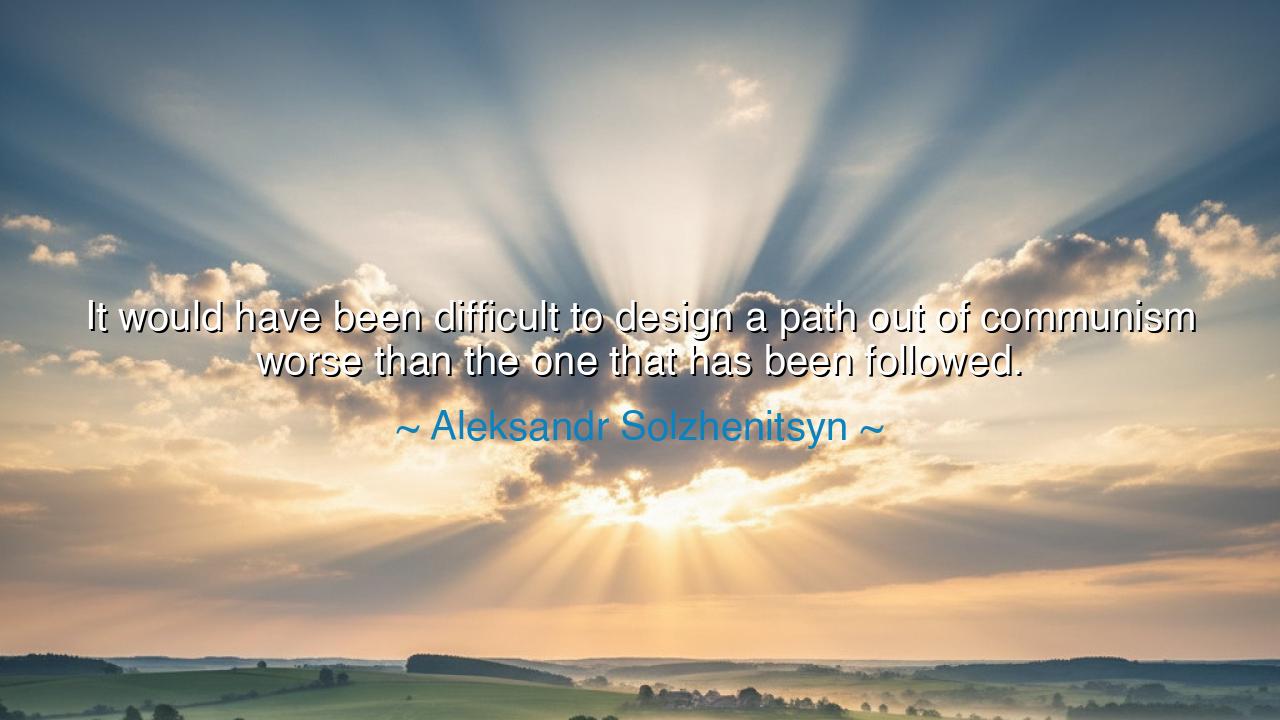
It would have been difficult to design a path out of communism
It would have been difficult to design a path out of communism worse than the one that has been followed.






“It would have been difficult to design a path out of communism worse than the one that has been followed.” – Aleksandr Solzhenitsyn
In these solemn and sorrowful words, Aleksandr Solzhenitsyn, the prophet of Russian conscience, speaks with the authority of one who has seen his nation suffer under tyranny and then stumble through freedom. His voice is that of both witness and lamentation. When he declares that it “would have been difficult to design a path out of communism worse than the one that has been followed,” he speaks not only of political failure, but of the moral collapse that followed the fall of an empire. He reminds us that when a system dies, its poison may yet live on in the hearts of its people — that the ruin of tyranny is not the end of oppression, but the beginning of a test.
The origin of this quote lies in the turbulent years following the collapse of the Soviet Union in 1991. Solzhenitsyn, who had spent years in exile for exposing the horrors of the Gulag, returned to his homeland in the mid-1990s to find a country disoriented, fractured, and spiritually impoverished. The iron grip of communism had been broken, but what followed was not renewal — it was chaos. The markets were unleashed without moral compass, wealth was seized by a few, corruption spread like fire, and the soul of the nation seemed adrift. What had been promised as liberty became exploitation; what had been hailed as democracy became disorder. Solzhenitsyn, who had dreamed of a Russia reborn in truth and faith, now saw instead a society consumed by greed and moral fatigue.
He spoke as a man of deep spiritual insight — one who understood that freedom without virtue is no freedom at all. The people, long enslaved by ideology, were unprepared for the sudden weight of responsibility. Communism had stripped them not only of property, but of the habits of conscience and self-governance. It had taught obedience, not initiative; dependence, not integrity. When the old order fell, there was no moral foundation to build upon. Solzhenitsyn saw in this the great tragedy of modern Russia — that the liberation from lies was followed not by truth, but by emptiness. Thus, his lament: that the path out of communism was not a path toward light, but another road of suffering, paved with the same blindness that had once built the prisons of the mind.
In his warning, there echoes the ancient rhythm of history. For every empire that has fallen without repentance has known this fate. When Rome decayed, it did not collapse from conquest alone, but from moral rot within. Its people, once disciplined and devout, had become enamored with luxury and spectacle. The republic that had built an empire through virtue and unity decayed into decadence and division. And so too did post-Soviet Russia face the same test: to build a nation not from the ashes of power, but from the fire of moral renewal. Solzhenitsyn, like a modern Jeremiah, cried out that without repentance, no transformation could endure. For the chains of the body may be broken in a day, but the chains of the soul take generations to shatter.
In his Nobel Lecture, Solzhenitsyn once said that “a great calamity is not only a punishment but also a lesson.” Yet in his later years, he feared that his nation had learned nothing from its pain. The communists had sought to design a perfect society and created a prison. The reformers, in turn, sought to design a perfect freedom and created an abyss. In both, there was arrogance — the arrogance of those who build nations without first building the human heart. Solzhenitsyn saw that the true rebirth of a people can never come from economics or ideology, but only from spiritual awakening — from a return to truth, to humility, to faith in something higher than man.
This truth extends beyond Russia, into every age and every land. When a people abandon virtue for wealth, or faith for comfort, their freedom becomes hollow. The lesson of Solzhenitsyn’s lament is universal: liberation without moral renewal leads only to new forms of bondage. Whether a nation emerges from tyranny, corruption, or despair, it must rebuild its soul before it rebuilds its state. The foundation of every enduring civilization is not law or policy, but character — the inner discipline to live in truth, justice, and compassion.
So, my listener, take this teaching to heart. When you see the fall of corruption or the dawn of new order, do not rejoice too quickly. Ask instead: Upon what soil will this new freedom grow? For if the soil is poisoned by cynicism, greed, or forgetfulness, the harvest will be bitter. Let every age learn what Solzhenitsyn saw — that no revolution can redeem a people unless it begins with the conversion of the soul. A new world cannot be built by those who have forgotten God, nor can justice be born from those who still love power.
And thus, let us remember his words not as condemnation, but as a call to wisdom: that the path from darkness to light must be trodden slowly, with humility and conscience as guides. Only then can a people rise not merely from tyranny, but into truth. Only then can the wounds of the past become the wisdom of the future. For as Solzhenitsyn teaches, history punishes those who rush to design freedom without understanding its sacred weight — but it rewards those who rebuild it, not on pride, but on faith, virtue, and remembrance.






AAdministratorAdministrator
Welcome, honored guests. Please leave a comment, we will respond soon